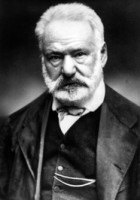
Les Miserables
by Victor Hugo
Published: 1862
Genres: Adult Fiction, Classic
Format: Paperback (1463 pages)
Source: Purchased
moreIntroducing one of the most famous characters in literature, Jean Valjean - the noble peasant imprisoned for stealing a loaf of bread - Les Misérables (1862) ranks among the greatest novels of all time. In it Victor Hugo takes readers deep into the Parisian underworld, immerses them in a battle betw...
I read Les Miserables unabridged. I read it because I wanted to know what really happens at the end since this 1400 + page book is usually abridged. Call it the rebel in me, but why should I let someone else choose what I should read out of this book? Oh, you don’t think I can read the whole thing? WATCH ME.
In addition to my rebelliousness, three separate people said to me with passion that I had to read Les Mis unabridged and I have to say it was worth it. The ending was amazing! It took me about 5 years to read it. I spent about 1 year actually reading it and 4 years convincing myself to read it. Cliffnotes were essential in me being able to finish it. Since I took long breaks from it, I would read all the summaries up to where I had stopped.
The story has an epic feel to it, but the plot was often interrupted by what I called “political rants” that ran on for about 20-30 pages. These little rants are probably what gets edited out in abridged versions. You’d come across a nunnery in the narrative and Victor Hugo would go, “Speaking of nuns…” and ramble on for 30 pages about what exactly he thought about nuns. Here’s a list of the political essays (which I named myself) that he inserted into Les Mis:
- The Battle of Waterloo (50 pages!) (Part 1, Book 1: Waterloo)
- The Uselessness of Convents (Part 2, Book 7: A Parenthesis)
- The Need for Universal Education (Part 3, Book 1: Paris Atomized)
- Politics of 1815-1832 (Part 4, Book 1: A Few Pages of History)
- Slang (Part 4, Book 7: Argot)
- Sewers and Poop (Part 5, Book 2: The Intestine of Leviathan)
What struck me the most about his essays was not how different the problems were back then, but how much they are the same. Don’t we still argue about politics and education today? Another thing that I noticed about the unabridged version was the fact that you got to learn the entire back story for almost every character you met. It added such depth and color to the story and made it truly unique.
Content Rating: None








 My name is Jessica. I love to read Young Adult and classic literature. I’ve been a book blogger for six years and I haven’t gotten tired of it yet. I’m a very curious reader. Writing about all the questions and thoughts I had while reading a book is the best hobby ever.
My name is Jessica. I love to read Young Adult and classic literature. I’ve been a book blogger for six years and I haven’t gotten tired of it yet. I’m a very curious reader. Writing about all the questions and thoughts I had while reading a book is the best hobby ever.
Great review! You have a fabulous blog! I’m an author and illustrator and I made some awards to give to fellow bloggers whose sites I enjoy. It’s not a pass on award. This is just for you to keep. I want to award you with the Best Books Blog Award for all the hard work you do! Thank you so much for taking the time to read and review all these books for us authors and readers.
Go to http://astorybookworld.blogspot.com/p/awards.html and pick up your award.
~Deirdra
Wow. I am really impressed that you finished this book. Congratulations!
so cool … I think I’ll just skip straight to the political essays/rants.